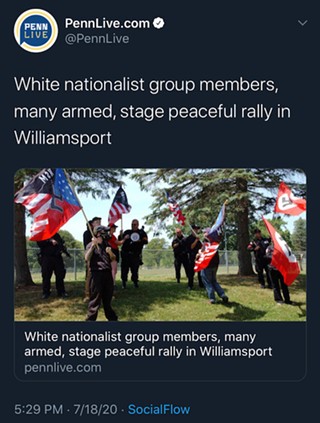Many people online criticized the post, saying that a racist group that advocates such causes could hardly be called “peaceful." PennLive deleted the tweet, changed the headline, and updated some language of the original story. PennLive also repacked the reporting in a different story which included some different language, too.
But for Jacob Klinger, a Pittsburgh-based PennLive reporter who covers the Steelers, his newspaper had not done enough. Klinger announced on Twitter today that he has quit, and that the paper’s coverage of the Neo-Nazi protest was the main reason why.
“Other experiences have formed this force of action, but Nazis are bad, and self-identifying Nazis don’t leave for any wiggle room,” says Klinger.I quit @PennLive today. They couldn't get to a place by July of 2020 to call out Nazis as Nazis. So I’m done.
— Jacob Klinger (@Jacob_Klinger_) July 23, 2020
Holler if you want some words. pic.twitter.com/8mN1MHB6Fz
In his statement on Twitter, Klinger also said the body of the original article “frames false equivalencies of the put-off passersby and the armed, Seig Heil-ing, Swastika-wearing, Nazi-flag flying Nazis.”
He acknowledges that the headline and the article were later altered, and that a follow-up article was also written, but he had issues with that as well. The follow-up article, titled “National neo-Nazi group holds ‘illegal’ protest in Pa. park: cops,” ran on July 20 and added descriptions not seen in the original story, like that the group “openly supports the oppression of minority groups.” However, Klinger notes that the follow-up, repacked story still said in the lead paragraph that the NSM members were the same as the group that marched at the Unite the Right rally in Charlottesville, Va. in 2017, but referred to that group as a “so-called Neo-Nazi group.” Marchers at the 2017 Unite the Right rally chanted, “Jews will not replace us,” and one of its participants murdered an anti-racist counter protester named Heather Heyer.
Klinger, who started working for PennLive in 2015, said in his statement that his ancestors didn’t get murdered by Nazis just for him to work at a website with any amount of Nazi apologists language.
“In July 2020, one of our reporters knew they could get away with calling avowed Nazis, ‘so-called Neo-Nazis,’ and those people killed my family, so I quit,” said Klinger.
He also is open about what he hopes to accomplish with his resignation, and the splash it might make. He understands that reporting softly on racists, the alt-right, or Nazis doesn't necessarily mean reporters are advocating for those subjects, but says it doesn’t matter if the PennLive reporting was due to "a lack of intellectual curiosity or just being unbothered." He says going softly on those subjects is unacceptable.
“It is a product of the culture,” says Klinger of his former employer. He says before announcing his resignation on Twitter, he had a meeting with Patriot-News publisher Cate Barron, which he says he appreciated, but his mind was already made up.
Barron did not respond to a request for comment by press time.
Klinger hopes that his resignation will motivate PennLive and the Patriot-News, as well as other newsrooms, to change how they cover the the alt-right and hate groups. “I would not have done this the way that I did it, if I didn’t think it would give PennLive the most likely chance of changing,” said Klinger.
In his statement, he mentioned that he was chastised for covering protests of Trump's Muslim ban that popped up in Pittsburgh on January 29, 2017. Klinger acknowledges his beat is the Steelers, but also says he was one of only a few other PennLive reporters stationed in Pittsburgh at the time. He also said that an editor killed a story in 2016 he had started to report about a Pittsburgh Holocaust survivor who was critical of Donald Trump.
Upon leaving the paper, Klinger says he left PennLive management some suggestions. These include: identifying Southern Poverty Law Center hate groups as such; during coverage of such hate groups, giving a voice to populations hate groups target; offering context in those stories of the nationwide rise in hate crimes; noting that the FBI has reported that members of these hate groups have infiltrated local police forces; and to acknowledge that the initial coverage of the Nazi protest was wrong and share some next steps.
Klinger says that he did enjoy many parts of his job at the paper, including covering the Steelers and the NFL. In his statement, he said he respects and believes in many of his former coworkers. But he says the frustration over the culture he says PennLive is enabling led to the failures in the Nazi protest coverage. He is hoping that amplifying his story will lead to some change.
“I am not the first person to quit out of frustration, and there is a level of privilege that I have that knows I will be okay for a month a so,” says Klinger. “But I did want to make this as loud as possible.”
He also hopes this will remind other publications of some issues in a lot of their own coverage, especially of protests. He says that people could search many publications and media outlets and find substantial reporting issues, even if they are less problematic than being soft on Nazis.
“Right now, a lot of coverage is showing unsubstantiated state power being used against people with water bottles, and that is being framed as an even fight,” says Klinger.
In Pittsburgh, some media outlets were still referring to Blacks Lives Matters protests in late May and early June as “riots,” despite that more than 90% of the people arrested at those events have had all charges dropped, and documentations of a protest on June 1 in East Liberty shows that Pittsburgh Police fired tear gas and sponge rounds at marchers, before marchers started throwing water bottles back.
“These are not games,” says Klinger. “They are people’s lives.”



